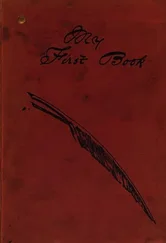But there, there, there! I shall get myself the character of a baby-hater if I talk any more in this strain. And Heaven knows I am not one. Who could be, to look into the little innocent faces clustered in timid helplessness round those great gates that open down into the world?
The world—the small round world! what a vast mysterious place it must seem to baby eyes! What a trackless continent the back garden appears! What marvelous explorations they make in the cellar under the stairs! With what awe they gaze down the long street, wondering, like us bigger babies when we gaze up at the stars, where it all ends!
And down that longest street of all—that long, dim street of life that stretches out before them—what grave, old-fashioned looks they seem to cast! What pitiful, frightened looks sometimes! I saw a little mite sitting on a doorstep in a Soho slum one night, and I shall never forget the look that the gas-lamp showed me on its wizen face—a look of dull despair, as if from the squalid court the vista of its own squalid life had risen, ghostlike, and struck its heart dead with horror.
Poor little feet, just commencing the stony journey! We old travelers, far down the road, can only pause to wave a hand to you. You come out of the dark mist, and we, looking back, see you, so tiny in the distance, standing on the brow of the hill, your arms stretched out toward us. God speed you! We would stay and take your little hands in ours, but the murmur of the great sea is in our ears and we may not linger. We must hasten down, for the shadowy ships are waiting to spread their sable sails.
11. On Eating And Drinking
I always was fond of eating and drinking, even as a child—especially eating, in those early days. I had an appetite then, also a digestion. I remember a dull-eyed, livid-complexioned gentleman coming to dine at our house once. He watched me eating for about five minutes, quite fascinated seemingly, and then he turned to my father with—
"Does your boy ever suffer from dyspepsia?"
"I never heard him complain of anything of that kind," replied my father. "Do you ever suffer from dyspepsia, Colly wobbles?" (They called me Colly wobbles, but it was not my real name.)
"No, pa," I answered. After which I added:
"What is dyspepsia, pa?"
My livid-complexioned friend regarded me with a look of mingled amazement and envy. Then in a tone of infinite pity he slowly said:
"You will know—some day."
My poor, dear mother used to say she liked to see me eat, and it has always been a pleasant reflection to me since that I must have given her much gratification in that direction. A growing, healthy lad, taking plenty of exercise and careful to restrain himself from indulging in too much study, can generally satisfy the most exacting expectations as regards his feeding powers.
It is amusing to see boys eat when you have not got to pay for it. Their idea of a square meal is a pound and a half of roast beef with five or six good-sized potatoes (soapy ones preferred as being more substantial), plenty of greens, and four thick slices of Yorkshire pudding, followed by a couple of currant dumplings, a few green apples, a pen'orth of nuts, half a dozen jumbles, and a bottle of ginger-beer. After that they play at horses.
How they must despise us men, who require to sit quiet for a couple of hours after dining off a spoonful of clear soup and the wing of a chicken!
But the boys have not all the advantages on their side. A boy never enjoys the luxury of being satisfied. A boy never feels full. He can never stretch out his legs, put his hands behind his head, and, closing his eyes, sink into the ethereal blissfulness that encompasses the well-dined man. A dinner makes no difference whatever to a boy. To a man it is as a good fairy's potion, and after it the world appears a brighter and a better place. A man who has dined satisfactorily experiences a yearning love toward all his fellow-creatures. He strokes the cat quite gently and calls it "poor pussy," in tones full of the tenderest emotion. He sympathizes with the members of the German band outside and wonders if they are cold; and for the moment he does not even hate his wife's relations.
A good dinner brings out all the softer side of a man. Under its genial influence the gloomy and morose become jovial and chatty. Sour, starchy individuals, who all the rest of the day go about looking as if they lived on vinegar and Epsom salts, break out into wreathed smiles after dinner, and exhibit a tendency to pat small children on the head and to talk to them—vaguely—about sixpences. Serious men thaw and become mildly cheerful, and snobbish young men of the heavy-mustache type forget to make themselves objectionable.
I always feel sentimental myself after dinner. It is the only time when I can properly appreciate love-stories. Then, when the hero clasps "her" to his heart in one last wild embrace and stifles a sob, I feel as sad as though I had dealt at whist and turned up only a deuce; and when the heroine dies in the end I weep. If I read the same tale early in the morning I should sneer at it. Digestion, or rather indigestion, has a marvelous effect upon the heart. If I want to write any thing very pathetic—I mean, if I want to try to write anything very pathetic—I eat a large plateful of hot buttered muffins about an hour beforehand, and then by the time I sit down to my work a feeling of unutterable melancholy has come over me. I picture heartbroken lovers parting forever at lonely wayside stiles, while the sad twilight deepens around them, and only the tinkling of a distant sheep-bell breaks the sorrow-laden silence. Old men sit and gaze at withered flowers till their sight is dimmed by the mist of tears. Little dainty maidens wait and watch at open casements; but "he cometh not," and the heavy years roll by and the sunny gold tresses wear white and thin. The babies that they dandled have become grown men and women with podgy torments of their own, and the playmates that they laughed with are lying very silent under the waving grass. But still they wait and watch, till the dark shadows of the unknown night steal up and gather round them and the world with its childish troubles fades from their aching eyes.
I see pale corpses tossed on white-foamed waves, and death-beds stained with bitter tears, and graves in trackless deserts. I hear the wild wailing of women, the low moaning of little children, the dry sobbing of strong men. It's all the muffins. I could not conjure up one melancholy fancy upon a mutton chop and a glass of champagne.
A full stomach is a great aid to poetry, and indeed no sentiment of any kind can stand upon an empty one. We have not time or inclination to indulge in fanciful troubles until we have got rid of our real misfortunes. We do not sigh over dead dicky-birds with the bailiff in the house, and when we do not know where on earth to get our next shilling from, we do not worry as to whether our mistress' smiles are cold, or hot, or lukewarm, or anything else about them.
Foolish people—when I say "foolish people" in this contemptuous way I mean people who entertain different opinions to mine. If there is one person I do despise more than another, it is the man who does not think exactly the same on all topics as I do—foolish people, I say, then, who have never experienced much of either, will tell you that mental distress is far more agonizing than bodily. Romantic and touching theory! so comforting to the love-sick young sprig who looks down patronizingly at some poor devil with a white starved face and thinks to himself, "Ah, how happy you are compared with me!"—so soothing to fat old gentlemen who cackle about the superiority of poverty over riches. But it is all nonsense—all cant. An aching head soon makes one forget an aching heart. A broken finger will drive away all recollections of an empty chair. And when a man feels really hungry he does not feel anything else.
Читать дальше












